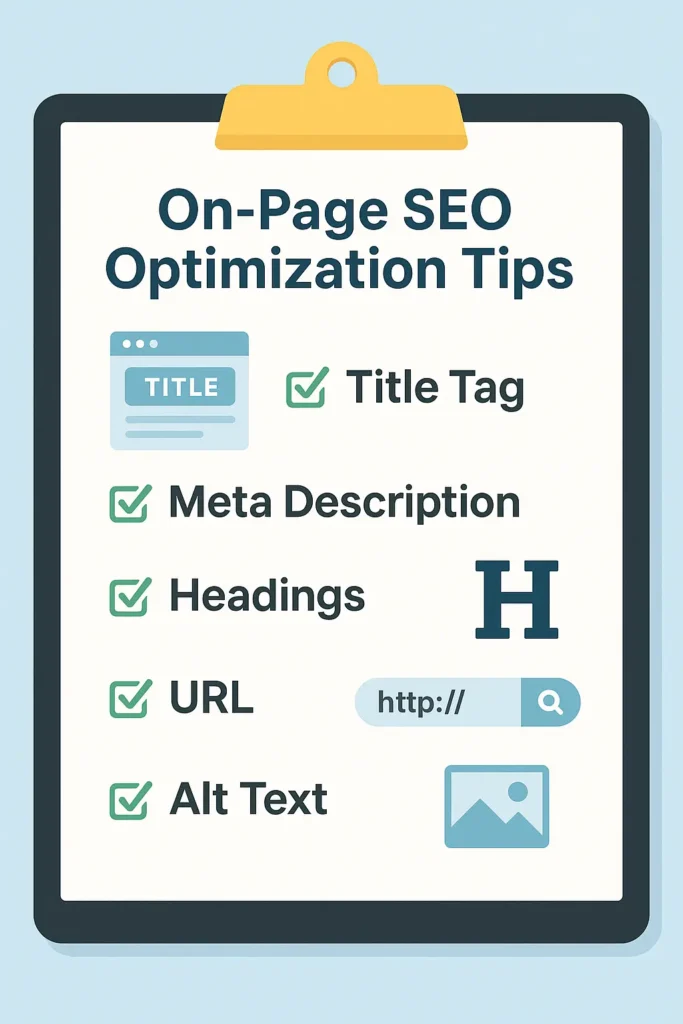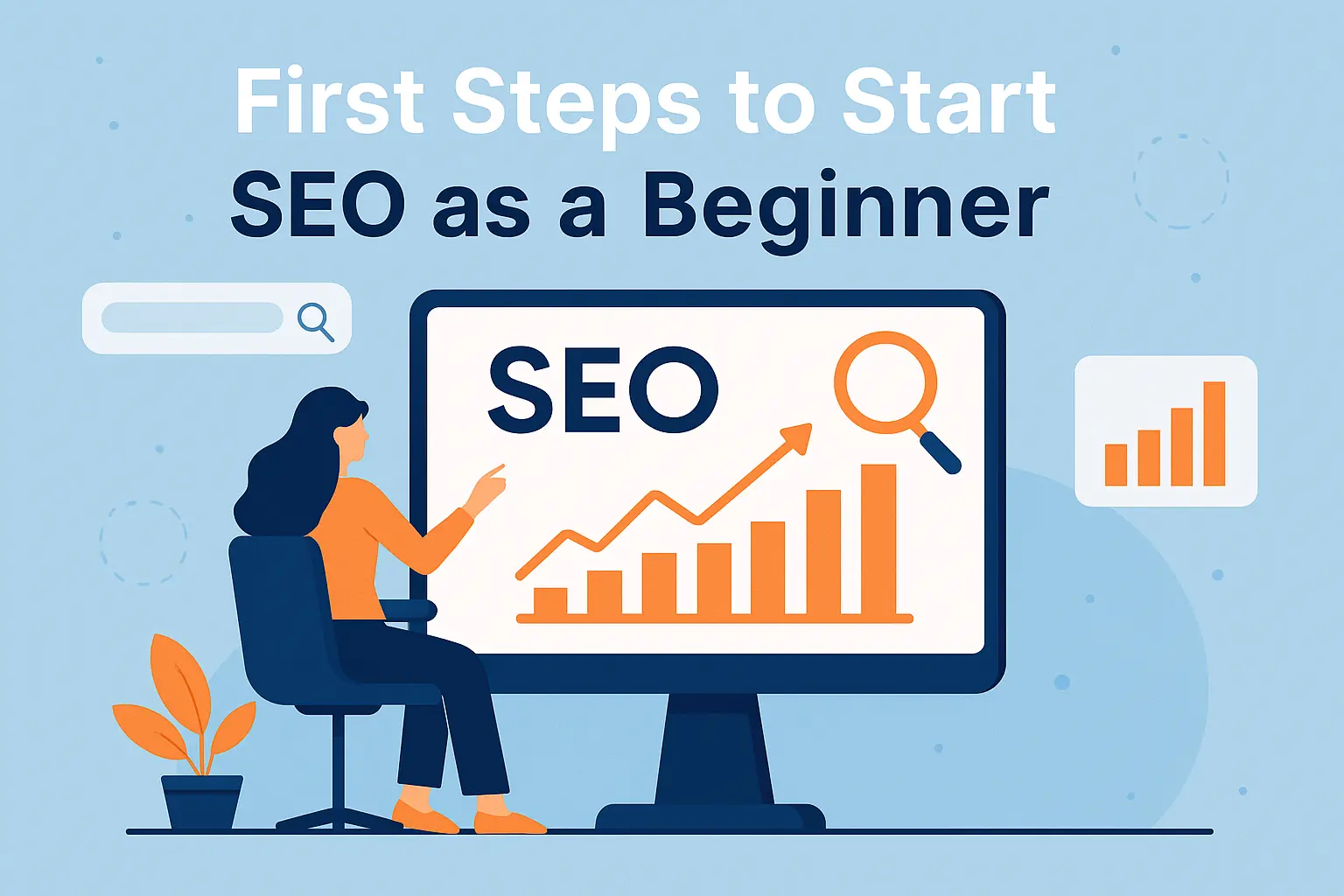First steps to start SEO as a beginner can feel overwhelming, especially with so much advice out there. But the good news? You don’t need to be a tech wizard to get started. If you’re wondering, “What are the first steps I should take to start SEO as a beginner?” — you’re not alone.
Did you know 68% of online experiences begin with a search engine? Whether you’re a blogger, small business owner, or just curious about SEO, this guide is tailored to walk you through essential first steps that set the groundwork for lasting organic visibility.
Table of Contents
What is SEO & Why It Matters for Beginners
Search Engine Optimization (SEO) is the process of improving your website’s visibility on search engines like Google. It helps your content appear higher in search results, bringing in more free (organic) traffic.
Why is SEO Crucial for Beginners?
- Increased Visibility: Higher rankings lead to more clicks and qualified traffic.
- Cost-Effective: Once implemented, SEO can continue driving traffic without ongoing ad spend.
- Builds Authority: Strong SEO builds long-term trust and credibility with both users and search engines.
📖 Learn more: Google’s SEO Starter Guide
First Steps to Start SEO as a Beginner
Step 1: Understand Your Niche and Audience
Before touching keywords or titles, define who you’re targeting:
- Who is your audience? Age, profession, interests, pain points.
- What makes you unique? Identify your niche and unique selling proposition (USP).
- Why should they choose you? Answer this clearly, and you’ll stand out.
Step 2: Learn How Search Engines Work
Search engines like Google use bots to crawl your site and index your content. Your job is to:
- Make your website crawlable
- Provide valuable, relevant content
- Structure pages so bots can understand them easily
Step 3: Do Smart Keyword Research
Keywords connect user intent to your content. Research the terms your audience is using to find information:
Tools to use:
- Google Keyword Planner
- Ubersuggest
- AnswerThePublic
- Google Autosuggest + “People Also Ask”

Tips:
- Target long-tail keywords (e.g., “how to start SEO for small businesses”)
- Focus on moderate search volume with low competition
- Align keywords with user intent (informational, navigational, transactional)
Step 4: Create High-Quality, Keyword-Optimized Content
Great content = SEO success. Write articles, blog posts, or landing pages that solve your audience’s problems.
How to do it:
- Use keywords naturally (1–1.5% density)
- Structure with H1, H2, H3 tags
- Include visuals and bullet points
- Showcase EEAT: Share expertise, cite sources, write clearly
Step 5: Optimize On-Page SEO Elements
- Title Tag: Under 60 characters, includes your main keyword
- Meta Description: Compelling, 150–160 characters with a CTA
- URL: Short, descriptive, and keyword-rich (e.g., /start-seo-beginner)
- Alt Text: Describes images clearly with keywords

Step 6: Strengthen Technical SEO
Technical SEO ensures your site is indexable, secure, and fast:
- Mobile-friendly (over 60% of searches happen on mobile)
- Fast loading (Google PageSpeed Insights, GTmetrix)
- Crawlable (submit sitemap, fix broken links)
- Use HTTPS for security
Step 7: Focus on User Experience (UX)
Search engines favor sites that users love. Enhance your UX:
- Easy navigation and clean layout
- Responsive design
- Engaging CTAs and clear internal links
Step 8: Build a Link-Building Strategy
Backlinks are like votes of confidence:
- Start with guest posting on niche blogs
- Join local directories
- Share your posts on LinkedIn, Reddit, and niche forums
Avoid black-hat techniques like buying links.
Step 9: Track Progress and Refine
Use data to guide improvements:
- Google Analytics: Track visitors and behavior
- Google Search Console: Monitor index coverage and keyword rankings
- Yoast SEO Plugin (for WordPress): Get real-time SEO feedback
Read more:
Understanding SEO Perfection According to Google’s John Mueller
Common SEO Mistakes Beginners Should Avoid
🚫 Keyword stuffing
🚫 Duplicate content
🚫 Not optimizing for mobile
🚫 Skipping analytics
🚫 Neglecting internal linking
Stay user-focused and update content regularly.
🌐 External Resources:
Conclusion
Mastering SEO as a beginner is completely achievable. Start with learning the basics, then move step-by-step through keyword research, content optimization, technical SEO, and link building.
✅ Ready to Begin?
Take your first small step today: perform a keyword search, optimize your homepage, or publish your first blog. SEO success is built one action at a time.
FAQs
What is the first thing to learn in SEO?
Understand how search engines crawl and index content. Once you know that, you’ll grasp why site structure and keywords matter.
How long does it take to see SEO results for beginners?
Typically 3–6 months depending on competition, content quality, and consistency.
Is SEO free or paid?
SEO is mostly free, but you can invest in tools like Ahrefs or SEMrush for faster results. The basics can be done without spending anything.
Do I need technical skills to start SEO?
No! Most beginner SEO tasks can be done without coding or web development experience.
Can I do SEO on my own website?
Absolutely. Many beginners start SEO solo using tools like WordPress, Rank Math, and free online courses.

